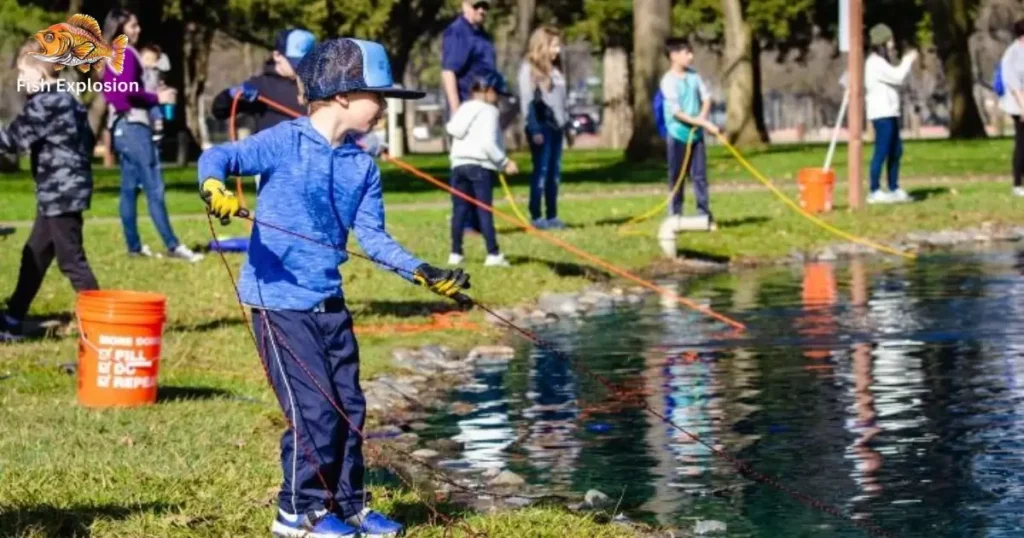Magnet fishing is a unique hobby that has gained significant popularity in recent years.
At its core, it involves using a powerful magnet attached to a rope or line to search for and retrieve metal objects from bodies of water, such as rivers, lakes, and canals. The allure of magnet fishing lies in the thrill of discovering hidden treasures, from lost jewelry and antique coins to discarded tools and even historical artifacts.
It combines the excitement of treasure hunting with the satisfaction of cleaning up waterways and removing potentially hazardous metal objects. Magnet fishers come from all walks of life, united by a shared passion for exploration, discovery, and environmental stewardship as they venture out in search of their next remarkable find.
What is Magnet Fishing?

Magnet fishing is a distinctive hobby that involves using a powerful magnet to retrieve metal objects from bodies of water. Participants attach a strong magnet to the end of a rope or line and cast it into lakes, rivers, canals, and other waterways.
Read More: “How Many Fish Exist In Our Oceans And Freshwaters?”
As the magnet descends, it attracts and collects any metallic items it encounters, allowing the magnet fisher to pull up a wide variety of lost, discarded, or submerged items. The discoveries can range from mundane objects like keys, tools, and hardware to more valuable finds such as jewelry, antique coins, and even historical relics.
Beyond the excitement of unearthing unexpected treasures, magnet fishing also provides an opportunity to help clean up aquatic environments by removing hazardous metal waste. This unique combination of treasure hunting and environmental stewardship is what captivates magnet fishing enthusiasts from diverse backgrounds.
What can I catch with Magnets?
Magnets can be used to catch a surprisingly wide variety of objects. Strong rare earth magnets are able to attract many types of metals from a distance, allowing you to pick up screws, nails, paperclips, small metal washers, nuts, and bolts that have fallen into hard to reach places.
Magnets are also able to pick up more non-traditional metal items like parts from electronic devices, small machine pieces, jewelry that contains metals like steel, iron shavings from a workshop, and even coins.
While plastics, wood, glass and other non-magnetic materials will not stick to a magnet, with the right magnet strength many small lost metallic items can be retrieved without difficulty, making powerful magnets a handy tool to have around the home or workshop.
Benefits of Magnet Fishing

Environmental cleanup: Magnet fishing helps remove potentially hazardous metal objects from waterways, improving water quality and safety.
Treasure hunting: The thrill of discovering unexpected items, from lost valuables to historical artifacts, makes magnet fishing an exciting hobby.
Family/community activity: Magnet fishing can be enjoyed by people of all ages, making it a great family or community-based activity.
Low-cost hobby: Beyond the cost of the magnet and equipment, magnet fishing is an inexpensive pastime compared to many other outdoor activities.
Health benefits: Magnet fishing encourages physical activity and time spent outdoors, which can have positive impacts on both physical and mental health.
Educational opportunities: Magnet fishing can lead to the discovery of interesting historical objects and learning about local history and geography.
Sense of accomplishment: The satisfaction of finding unique and valuable items through one’s own efforts is a rewarding aspect of magnet fishing.
Connecting with nature: Being out on the water and interacting with the natural environment is a peaceful and grounding experience for many magnet fishers.
Portable and versatile: Magnet fishing equipment is easy to transport, allowing the activity to be enjoyed in a variety of waterfront locations.
Potential income source: Some dedicated magnet fishers are able to supplement their income by selling or auctioning off their more valuable finds.
Is Magnet Fishing the Same as Metal Detecting?
While magnet fishing and metal detecting may seem similar on the surface, they are distinct hobbies with notable differences. Metal detection involves using a handheld device that scans the ground to locate buried metal objects, often on land.
In contrast, magnet fishing utilizes a powerful magnet on the end of a rope or line to search for and retrieve metal items from bodies of water, such as rivers, lakes, and canals. Metal detectors excel at finding smaller, more shallow objects, while magnet fishing is better suited for recovering larger, submerged items.
Additionally, magnet fishing provides the added benefit of helping to clean up waterways by removing potentially hazardous metal waste. So while both activities involve the thrill of discovering hidden treasures, magnet fishing offers a unique water-based experience and environmental impact that sets it apart from traditional metal detecting.
What Types of Magnets are Used?
At the heart of magnet fishing is, of course, the powerful magnet that does the work of attracting and retrieving metal objects from the water. The magnets used by magnet fishers are typically neodymium magnets, also known as rare earth magnets.
These are incredibly strong, high-powered magnets that can lift hundreds or even thousands of pounds of metal. The size and strength of the magnet used depends on the specific applications and preferences of the magnet fisher.
Smaller magnets in the 200-500 pound pull range are suitable for casual hobbyists, while more serious magnet fishers may employ massive 1,000 pound pull magnets to haul up large, heavy items.
In addition to the pull strength, magnets used for this activity also need to be waterproof to withstand repeated submersion.
With the right magnet, magnet fishers are able to uncover a diverse array of metallic treasures from the depths.
Why is magnet fishing illegal?

While magnet fishing is a rapidly growing hobby with many enthusiasts worldwide, it is important to note that in certain locations, this activity may be restricted or deemed illegal. The primary reason is that magnet fishing can be seen as a form of unauthorized treasure hunting or retrieval of items from public or private waterways.
In some jurisdictions, removing objects from bodies of water without proper permission or permits is considered trespassing or theft, even if the items were thought to be abandoned. There are also concerns that magnet fishing could potentially disturb sensitive aquatic environments or archaeological sites.
As a result, authorities in some regions have enacted laws or regulations prohibiting or limiting magnet fishing activities. It is crucial for magnet fishers to research and comply with all relevant local laws and regulations before engaging in this hobby, to avoid potential legal consequences.
FAQ’s
What does a fishing magnet do?
A fishing magnet is used to attract and retrieve metal objects from bodies of water.
Is there money in magnet fishing?
Yes, magnet fishing can potentially generate income through the sale of valuable finds like antiques, jewelry, and historical artifacts.
Why is magnet fishing illegal in the United States?
Magnet fishing may be illegal in certain US locations if it is considered unauthorized treasure hunting or disturbing protected aquatic environments without proper permits.
What do people do with their magnet fishing finds?
People keep, sell, or donate their magnet fishing finds, from everyday objects to rare and valuable treasures.
Conclusion
Magnet fishing is a fun and intriguing hobby that allows enthusiasts to discover unexpected items from bodies of water. While the activity gained popularity from videos posted online of rare finds being pulled out, its simplicity and low costs have helped more people get involved.
Beyond serving as an entertaining way to spend leisure time, magnet fishing also helps remove scrap metal and other junk from rivers, lakes, and canals that may pose environmental or safety hazards if left untouched. For those willing to regularly search unknown waters, there is also an air of mystery in not knowing what pieces of history or value could be concealed below the surface.
Overall, magnet fishing combines elements of hunting for treasure, environmental stewardship, and adventure – making for a unique outdoor pursuit suitable for all ages that continues to attract more participants worldwide.
With three years of dedicated expertise in the niche of fish, my domain knowledge encompasses breeding, habitat maintenance, health management, and sustainable aquaculture practices, ensuring optimal outcomes in the aquatic realm.











